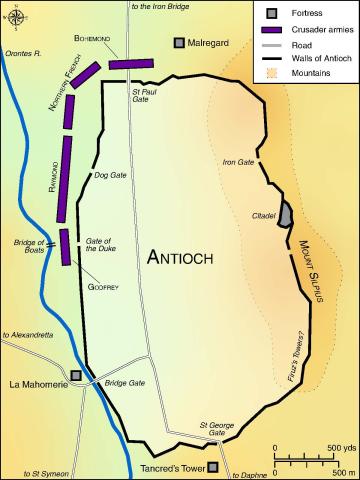The Capture of Antioch
[8.20.8] Tunc innumerābilis fragor mīrābiliter resonābat per tōtam urbem. Nōn acquiēvit Boamundus hīs, sed īlicō imperāvit honōrābile vēxillum dēferrī sūrsum, cōram castellō, in quōdam monte. Omnēs vērō pariter strīdēbant in cīvitāte. Summō autem dīlūculō, audientēs illī quī foris erant in tentōriīs vehementissimum rūmōrem strepere per cīvitātem, exiērunt festīnantēs et vīdērunt vēxillum Boamundī sūrsum in monte, celerīque cursū properantēs vēnērunt omnēs, et per portās intrāvērunt in urbem; et interfēcērunt Turcōs et Saracēnōs quōs ibi repperērunt, extrā illōs quī fūgerant sūrsum in castrum.
[8.20.9] Aliī vērō Turcōrum per portās exiērunt, et, fugientēs, vīvī ēvāsērunt. Cassiānus vērō, dominus illōrum, timēns valdē gentem Francōrum, dēdit sē omnimodō fugae, cum aliīs multīs quī erant cum eō; et fugiendō pervēnit in Tancredī terram nōn longē ā cīvitāte. Fatīgātī vērō erant equī eōrum, mīsēruntque sē in quoddam casāle, et mersī sunt in ūnam domum. Cognōvērunt ergō eum habitātōrēs illīus montaneae, scīlicet Syriānī, et Armeniī; et cōnfestim apprehendērunt eum, truncāvēruntque caput illīus, et tulērunt ante Boamundī praesentiam, ut inde merērentur lībertātem accipere. Balteum quoque ēius et vāgīnam appretiāvērunt sexāgintā bizanteīs.
[8.20.10] Haec omnia gesta sunt tertiā diē intrante mēnsē Iūniō, quīntā fēriā, III nōnās Iūniī. Omnēs namque platēae cīvitātis iam undique erant plēnae cadāveribus mortuōrum, ita ut nēmō posset sufferre ibi esse, prae nimiīs foetōribus. Nūllus vērō poterat īre per sēmitam cīvitātis, nisi super cadāvera mortuōrum.
notes
(June 1098) There is much screaming, as the inhabitants realize that crusaders have entered the city. Bohemond has his banner planted on a hill opposite the citadel, as a signal to the other crusaders to enter the city. The Turks and Saracens who do not escape to the citadel (which remains in Turkish hands) are slaughtered. The Turkish governor of Antioch (Yaghi Siyan) flees to a nearby village, but is betrayed by local Christians and killed. In Antioch the ground is covered with corpses.
8.20.8
Nōn acquiēvit Boamundus hīs: "Bohemond did not delay because of these things" (or perhaps "did not yield to these things")
castellō: “the citadel," high on Mount Silpius, still held by the Turks.
quōdam monte: on one of the hills next to the citadel.
vehementissimum rūmōrem strepere per cīvitātem: indirect statement, depending on audientes.
in castrum: to the citadel (castellum).
8.20.9
Cassiānus: Yaghi Siyan, the Seljuk governor of Antioch.
in Tancredī terram nōn longē ā cīvitāte: i.e., to the territory beyond the fort Tancred had occupied (8.19.1), opposite the St. George Gate.
mīsēruntque sē: the subject is not the fatīgātī ... equī but their riders, supplied by eōrum
in quoddam casāle: “to some village” (ML).
ut inde merērentur lībertātem accipere: “that by doing this (inde) they might be worthy to receive freedom.” The Syrians and Armenians were not slaves or captives, so presumably this means “so that the Franks would spare them.”
Balteum: the baldric (an over the shoulder sword belt) was, among the Franks, a symbol of knighthood.
8.20.10
tertiā diē intrante mēnsē Iūniō, quīntā fēriā, III nōnās Iūniī: Thursday, June 3, 1098.
prae nimiīs foetōribus: CL would be propter nimiōs foetōrēs.
vocabulary
8.20.8
fragor –ōris, m.: commotion
acquiescō acquiescere acqiēvī: to rest, relax
dīluclum –ī, n.: dawn, daybreak
vexillum –ī, n.: military standard, flag, banner
sursum: up, in an upwards direction
cōram: before, in front of (prep. + abl.)
castellum –ī, n.: fort, citadel
strīdō strīdere strīdī: to shriek
strepō strepere strepuī strepitum: to shout confusedly, yell (OLD 2)
cursus cursūs, m.: the action of running
extrā: apart from, except (OLD 9)
sūrsum: up, in an upwards direction
8.20.9
vīvus –a –um: alive
casāle –is, n.: village (ML)
mergō mergere mersī mersum: to plunge; to cover over and hide (OLD 7)
cōnfestim: immediately
truncō (1): to cut off (OLD 2)
balteum –ī, n.: baldric (an over the shoulder sword belt; it was the symbol of knighthood).
vāgīna –ae, f.: sheath, scabbard
appretiō (1): to value at (LL)
bizanteus –ī, m.: bezant (a Byzantine gold coin; ML)
8.20.10
platea –ae, f.: street, avenue
foetor –ōris, m.: stench
sēmita –ae, f.: footpath

